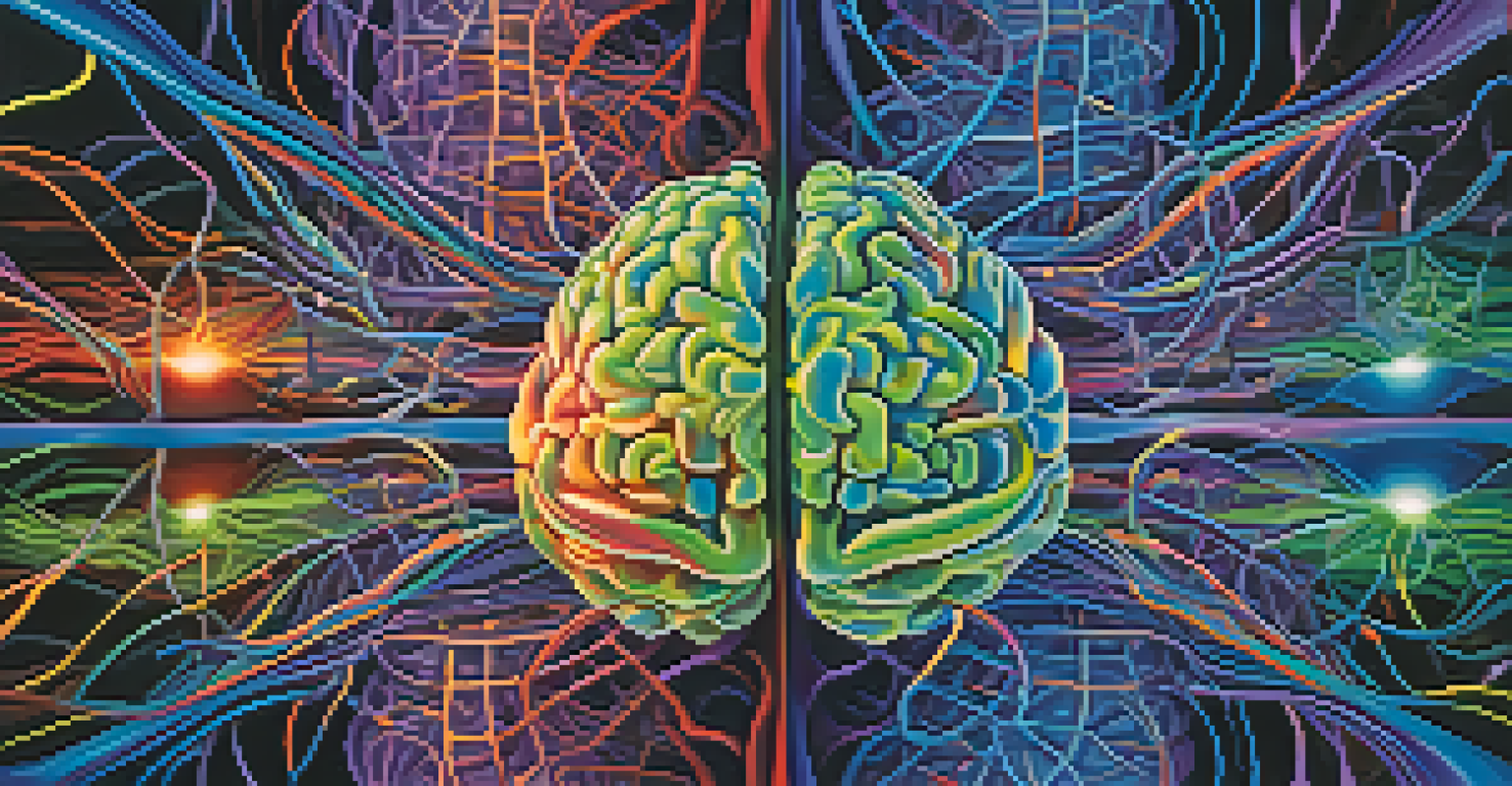Altered States: Entheogens and Self-Perception Changes

Understanding Altered States and Entheogens
Altered states of consciousness are experiences that differ significantly from our normal waking state. They can be induced by various means, including meditation, sensory deprivation, and the use of entheogens. Entheogens, often derived from plants or fungi, are substances used in a spiritual or religious context to facilitate these altered states.
The greatest discovery of my generation is that a human being can alter his life by altering his attitudes.
These substances, such as psilocybin mushrooms or ayahuasca, have been used for centuries in various cultures, often for healing or spiritual growth. When consumed, they can lead to profound insights and a sense of connection with the universe. Understanding the role of these substances is crucial for grasping their impact on self-perception and consciousness.
By exploring altered states through entheogens, individuals can access parts of their psyche that are usually obscured by everyday life. This exploration often leads to significant shifts in how they view themselves and their place in the world.
The Science Behind Entheogens and Brain Function
Recent studies have shed light on how entheogens affect brain function, particularly in areas related to self-perception and identity. For instance, substances like LSD and psilocybin can temporarily alter neural pathways, leading to new ways of thinking. This is often characterized by a breakdown of the default mode network, which is responsible for our sense of self.

When the default mode network is disrupted, individuals may experience a feeling of ego dissolution, where the boundaries between self and other blur. This can lead to a heightened sense of connection with others and the universe, ultimately changing how one perceives themselves. The scientific community is increasingly interested in these effects, especially in therapeutic settings.
Entheogens Induce Altered States
Substances like psilocybin and ayahuasca can facilitate profound altered states of consciousness, leading to transformative insights.
Understanding the neurobiological mechanisms at play helps demystify the powerful experiences associated with entheogens. This insight can encourage responsible use and further exploration of their potential benefits.
Personal Transformation Through Entheogenic Experiences
Many individuals report transformative experiences after using entheogens, often describing profound shifts in self-perception. These experiences can lead to greater empathy, acceptance, and understanding of oneself and others. For example, someone grappling with anxiety may find that a single session with psilocybin leads to a newfound sense of peace and clarity.
Entheogens are not merely substances; they are a means to explore the depths of our consciousness and connect with the universe.
These shifts in perception can foster personal growth, helping individuals to confront and overcome deeply rooted fears or traumas. The insights gained during these altered states often resonate long after the experience, providing a framework for personal development. It's not uncommon for participants to feel inspired to make positive life changes.
Moreover, the communal aspect of many entheogenic experiences, such as those in a guided setting, can enhance feelings of connection and support. This collective journey can be just as important as the individual transformation, reinforcing the idea that we are all interconnected.
Cultural Perspectives on Entheogens and Self-Perception
Throughout history, various cultures have utilized entheogens for spiritual and healing practices, shaping their understanding of self and the universe. From the indigenous use of peyote in Native American ceremonies to the Amazonian traditions surrounding ayahuasca, these substances play a vital role in many societies. They often serve as tools for introspection and community bonding.
Cultural perspectives on entheogens can influence how individuals perceive their own identities. For example, in cultures that regard these substances as sacred, the experiences may be integrated into one's spiritual journey, leading to profound changes in self-perception. In contrast, in societies where entheogens are stigmatized, individuals may struggle with the duality of their experiences.
Therapeutic Benefits of Entheogens
Research highlights the potential of entheogens in treating mental health conditions such as PTSD and depression through facilitated self-exploration.
By examining these cultural contexts, we can appreciate the diverse ways that entheogens influence self-perception and consciousness. Understanding these differences can foster greater respect for the practices of different cultures and encourage a more nuanced dialogue about the role of these substances.
Therapeutic Uses of Entheogens in Modern Psychology
In recent years, there has been a resurgence of interest in the therapeutic potential of entheogens within modern psychology. Research has shown promising results for treating conditions such as PTSD, depression, and anxiety. By facilitating altered states, entheogens can help patients confront unresolved issues, leading to breakthroughs in their mental health journeys.
For instance, clinical trials using psilocybin-assisted therapy have demonstrated significant reductions in depressive symptoms, with some participants reporting long-lasting changes in mood and self-perception. This emerging field highlights the potential for entheogens to serve as effective adjuncts to traditional psychotherapy.
As the stigma surrounding these substances diminishes, more mental health professionals are considering their use in therapeutic settings. This evolution in understanding could pave the way for innovative treatments that empower individuals to reshape their self-perception and enhance their overall well-being.
Challenges and Risks of Entheogen Use
While entheogens offer potential benefits, they also come with challenges and risks that must be acknowledged. Not everyone is suited for these experiences, and factors such as mental health history can significantly impact outcomes. For example, individuals with a predisposition to psychosis may experience adverse reactions during an entheogenic experience.
Additionally, the context in which entheogens are consumed plays a crucial role in determining the overall experience. Using these substances in uncontrolled or unsafe environments can lead to negative outcomes, including anxiety or distress. It's essential for individuals to seek guidance and use entheogens responsibly.
Cultural Influences on Perception
Different cultural contexts shape how entheogens are perceived and used, affecting individual self-understanding and spiritual practices.
By understanding these challenges, individuals can make informed decisions about potential use. Promoting education and awareness around the risks associated with entheogen use is vital for fostering safe and beneficial experiences.
Navigating the Future of Entheogens and Self-Perception
As research into entheogens continues to evolve, so does our understanding of their impact on self-perception. The growing body of evidence suggests that these substances can facilitate meaningful change, not only for individuals but also within society. As more people share their experiences, the collective narrative surrounding entheogens is likely to shift.
Future discussions surrounding entheogens will need to focus on ethical considerations, accessibility, and the importance of informed consent. As we navigate this landscape, it's crucial to prioritize safety and responsibility while embracing the potential for personal growth and healing.

Ultimately, the journey of exploring entheogens and their effects on self-perception is just beginning. By fostering open dialogue and continued research, we can better understand how these substances can contribute to our well-being and reshape our understanding of self.